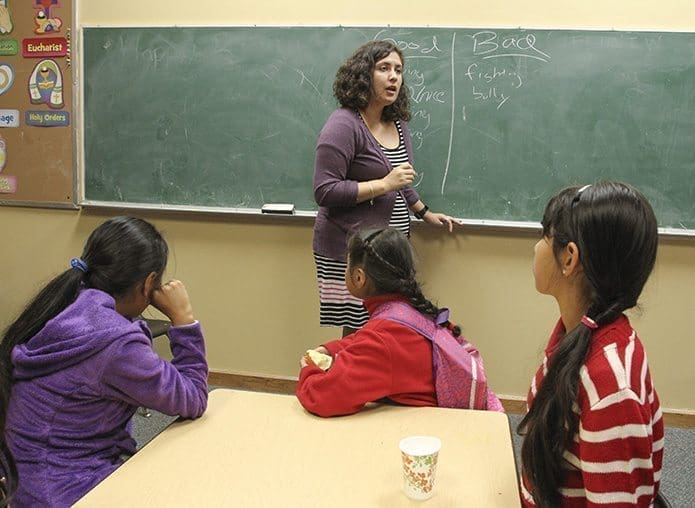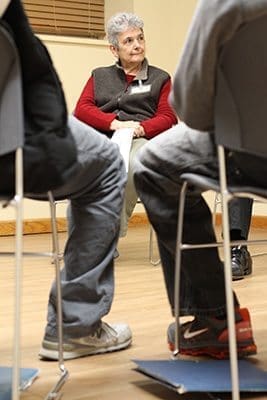 Photo By Michael Alexander
Photo By Michael AlexanderAtlanta
With its Catholic roots, Caminar Latino supports families
By ANDREW NELSON, Staff Writer | Published November 13, 2014
ATLANTA—The newest youngster in the class gets his pick of a plush teddy bear, a cow, or another treasure among the stuffed animals. He goes home with a fuzzy white, snowball-looking creature as a reminder of the friends he made in this support group.
The boy also hears why the group exists: The 18 kids have seen their parents get abusive and violent.
“Everyone comes here for the same reason,” the group leader, Leo Martinez, tells the class.
Students later will role-play about being a good friend.
It is a midweek evening at an Atlanta Catholic church. Its name is not publicized to keep the program’s participants safe. The facilities are bustling as more than 125 people attend the weekly family support program of Caminar Latino, Inc.
“We see our role as walking with the families on their journey to nonviolence,” said the executive director, Jessica Nunan, before she leads the young adult group which crowds into a conference room.
According to the National Latin@ Research Center, nearly one in four Latina women experiences domestic violence during her lifetime. This mirrors the rate of violence suffered by women from other racial and ethnic groups, but it happens in a unique cultural context.
Her immigration status, especially if it is illegal, may make a Latina woman fearful to seek help. The family unit is so valued in Latino culture, many women remain in violent situations instead of breaking the family apart.
Caminar Latino serves the whole family, from men who commit the abuse and women who suffer at their hands to children who see it. For men, the program offers 24 sessions of family violence intervention classes. For women, there are support groups to share information about parenting skills and an understanding of domestic violence, and longer-term services like trauma and mental health counseling. And for the youngest, the programs teach about healthy relationships, self-respect and safety skills.
The nonprofit’s roots are Catholic, as are its leaders.
Back in the 1990s, a sister of the Grey Nuns of the Sacred Heart saw women at Our Lady of the Americas Mission, when it was in Doraville, with bruises. Sister Barbara Harrington pushed Julia Perilla to organize women to come together to talk about what was happening in their families and their homes. Perilla tried to convince Sister Barbara she was the wrong person.
“She said, ‘Don’t worry; the women will teach us.’ And teach us they did,” Perilla said.
Churches provide safe spaces for families
Twenty-five years later, the group in a year serves more than 700 women, children and men.

Julia Perilla, one of the cofounders of Caminar Latino, facilitates a discussion with a group of 10 men during a weekly family initiatives session at an Atlanta Catholic church. The Chamblee-based nonprofit walks with Latino families toward a journey of nonviolence. Photo By Michael Alexander
“It was the hand of God, I see,” said Perilla, a clinical community psychologist and an assistant professor at Georgia State University who continues to serve the organization.
Perilla teaches ethics but has developed an expertise on Latino immigrant families. She leads the National Latin@ Research Center on Family and Social Change and Casa de Esperanza’s National Latin@ Network for Healthy Families and Communities at the university.
The program leans on the wisdom of the women.
“They know how to stay alive in ways I would never dream of,” said Perilla.
Her Catholic faith is tied to this effort. The dignity of each person is upheld at the organization, which means not seeing people in the worst light, she said.
“I have to look beyond the label. If I don’t see the whole person, I miss out on the good parts, the parts that are salvageable,” she said.
Nunan, the executive director, was introduced to the program attending St. Pius X High School when she did her community service hours. The experience led her to study psychology and then earn her master’s degree in social work. She is also Perilla’s daughter. She grew up in a home where social justice and looking out for others was emphasized.
“With certain privileges, comes responsibility,” said Nunan.
Caminar Latino works by respecting Latino “cultural codes.” A key feature is the central role of the family, where unity is key, along with the roles given to the man as breadwinner and the woman as caretaker of the family.
“The idea of marianismo, where (a woman) puts herself last, can sound very admirable, but if it puts her in danger, it can be misconstrued,” said Nunan.
Instead, the organization emphasizes how the mother’s safety and wellbeing is also essential to the family, she said.
“It’s a very difficult thing when you hear everything the women have gone through. They are incredibly smart and strong. They know what they need, basically, to get the family to a safe place,” Nunan said.
Partnering with the faith community has been central to Caminar Latino’s mission.
The space is respected as “God’s house” so participants treat it with seriousness, with no experience of violence, she said.
“Catholic churches have helped to provide spaces in which our families have felt safe and welcomed. This would not have been possible if we had been in a different setting,” she said.
Issues of domestic violence in the Latino community are complex.
Priests and other well-intentioned people may encourage couples to sit down for counseling, but that may expose the woman to more violence if the man blames the woman for sharing family secrets, Nunan said. Parish leaders instead assist them by linking the woman and man with resources to assist them, she said.
Also, suggesting a woman leave the home can create its own dangers, not only from the abuser, but it puts the family at risk, too. Immigration status presents additional challenges.
“It takes the limited resources and makes them much smaller,” Nunan said.